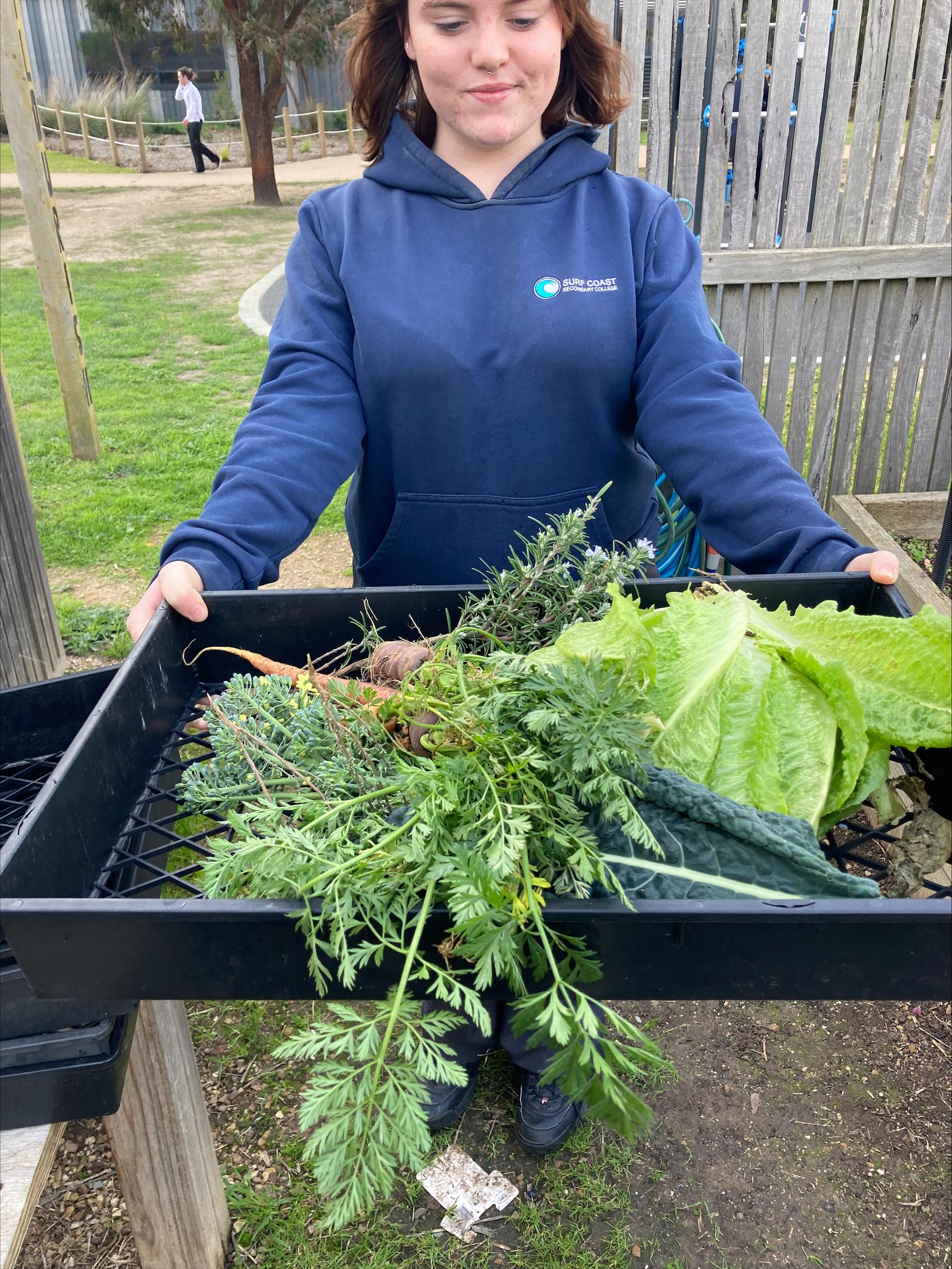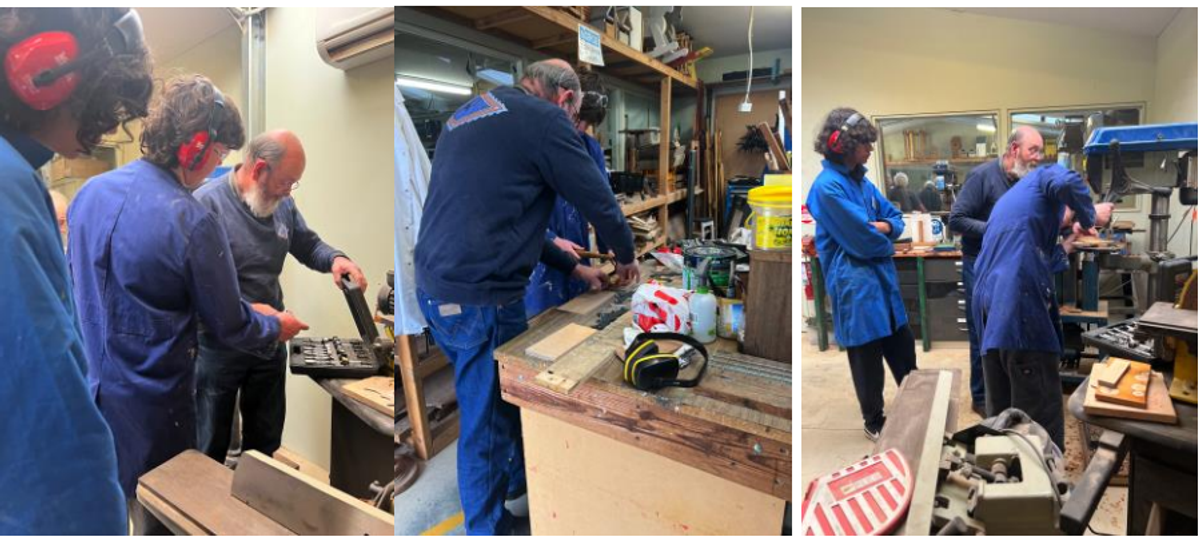WELLBEING

Accessing Wellbeing
Students can access wellbeing via an online booking form for Wellbeing and health related matters.
Student Wellbeing Check In Request Form
Parents/ carers can access supports from Wellbeing for their young person via the Administration Office.
SURFSUP WITH THE WELLBEING TEAM
This term is certainly flying by, and the wellbeing team has been getting into the groove with seeing students and supporting the groups that are being run out of the wellbeing space.
Jaz has been out and about this week at Little Davinci, Women’s Shed, Men’s Shed and Story Time. Students enjoy the time spent in the community and being mentored. Here we have some of the students making key ring holders under the guidance of Paul.
We are excited to be welcoming Sarah into the Wellbeing space as the new Mental Health Practitioner. They will be a wonderful addition to the space, and we look forward to them supporting our students.
Talking to your young person around Drugs & Alcohol
Adolescence is a challenging time for all concerned, with many parents feeling as though they are not adequately prepared, particularly in areas such as alcohol and other drugs. Although parents often doubt their importance and influence during the teenage years, research indicates that they play a vital role in the development of their adolescent children.
Every family is different and there are a range of different circumstances that will dictate how a parent responds to problems that may arise in this area. Having good quality, accurate information is vital.
For many young people, trying alcohol, tobacco and vaping is a common part of adolescence. A few teenagers might try illegal drugs, like cannabis or ecstasy. But for some, experimenting with or using alcohol and other drugs can be a sign of more serious problems and can lead to substance abuse and poor mental health.
Alcohol, cigarettes, ecigarettes and other drugs: what’s safe for teenagers
There’s no safe level of alcohol use for children under 18 years. Their brains and bodies are still developing and can be easily damaged.
Smoking cigarettes, breathing second-hand smoke and third-hand smoke and vaping (using e-cigarettes) are not safe. Using other drugs like cannabis, crystal meth, ecstasy and cocaine is also never safe.
If your child is using or overusing alcohol or other drugs, or your child feels they can’t have a good time without alcohol or other drugs, it can be a serious problem.
Warning signs of alcohol and other drug problems
Some signs that your child is using alcohol or other drugs might be up-and-down moods, outbursts that are out of character and big changes to clothes, friends and interests. But these signs are also typical parts of adolescence too. Here are some warning signs that might mean you need to act.
School and social life
Your child might be:
- doing worse at school or skipping school
- using secret or ‘coded’ language when talking with friends
- being more secretive about their things or where they’re going
- isolating themselves more than usual
- spending a lot of time with new friends who might be less interested in regular school or family activities
- wearing different clothes or jewellery, especially ones that feature drug symbols or paraphernalia.
Behaviour
Your child might:
- have changes in mood that are out of character
- start wearing sunglasses more often or indoors
- have changes in sleeping habits – for example, high energy and sleeplessness, trouble waking up or a desire to sleep for most of the day
- seem very agitated or irritable, especially in the morning
- stay in their room more than usual
- suddenly lose interest in family activities
- start using incense or air fresheners to hide the smell of smoke or other substances.
Health and hygiene
Your child might:
- have sudden breakouts of very ‘angry’ acne
- feel nauseous or vomit in the morning or when they come home
- take less care of their appearance
- want clothes washed more than usual
- wash their hair more than usual
- start using mouthwash or breath mints for the first time or more than usual.
Money
Your child might:
- borrow or ask to borrow more money than usual
- sell possessions or steal money or other items from your home
- have more money than usual for no obvious reason.
Unusual items
If you find any of the following items in your child’s possession, it’s a good idea to talk with your child about them while also trying to keep an open mind:
- drug paraphernalia, like needles, pipes, rolling papers or small plastic zip-lock bags
- bottles of eye-drops, which can be used to mask bloodshot eyes or dilated pupils
- missing prescription drugs or alcohol
First steps when you think teenagers are using alcohol or other drugs
If you notice any of the signs above or find things that worry you, the first step is talking with your child.
This might be a difficult conversation, but it’s important for your child’s long-term mental and physical health that you get the conversation going. Talking and actively listening are the first steps towards acknowledging that the issue is serious and doing something about it.
Here are some tips that might help you get started.
Plan ahead
Before you speak with your child, learn more about alcohol and other drugs. Learning more prepares you for helping your child. It’s also a good idea to plan and practise what you’ll say to your child. This can help you stay as calm as possible.
Encourage your child to talk
It’s important to keep lines of communication open, listen calmly and hear your child’s side of the story. You might have to try a few times.
Try to choose a time when you’re ready and your child is sober. If your child is affected by drugs or is drunk, or you’re angry and worked up, talking together isn’t likely to go well.
Keep your communication positive
If you’re calm and positive, you and your child are more likely to have an open and honest conversation. Blaming, lecturing or criticising can make your child shut down and might lead to an argument.
Try to avoid labels like ‘drug user’ or ‘addict’. It might seem like you’re making the issue bigger than it is. This could mean your child won’t want to be part of the conversation.
Focus on behaviour
If you’re concerned about your child, try focusing on the behaviour, rather than on alcohol and other drugs.
For example, your child might be behaving in aggressive or other ways that seem to be a result of alcohol or other drug use. You could say something like, ‘I’ve noticed that you’ve started behaving in an aggressive way at home recently. We need to talk about it. Let’s make a time to do that’.
Try to stay calm and choose your words carefully.
Next steps when teenagers are using alcohol or other drugs
After you’ve spoken with your child and you have an idea of how serious the problem is, you can learn more about the particular drugs your child is using. Drug fact sheets are a good source of information. They also tend to include worst-case scenarios, so try not to panic or make assumptions about your child or the problem.
Your child might not be ready to admit that their alcohol or other drug use is a serious issue. They might not want your help. If your child isn’t ready or interested, avoid forcing the issue. Young people need to make their own decisions to cut down or stop their use of alcohol or other drugs.
But if your child is having a problem, there are some things you could try, if they’re right for your family:
- Remove alcohol from your home.
- Supervise and monitor your child’s use of and exposure to alcohol and drugs.
- Renegotiate your family's rules.
- Arrange drop-offs and pick-ups when your child goes out.
- Withdraw, adjust or closely monitor your child’s pocket money
If your child is going through a hard time with alcohol or other drugs, it can affect the whole family. Try to keep the lines of communication open with your partner and your other children so that you can all support each other.
You canbe a role model for your child in your behaviour and attitudes towards alcohol and other drugs. You can also influence your child by staying connected with your child and managing your child's behaviour in a positive way.
Where to get help for alcohol and other drug use
There are many resources and support options for you, your child and your family. You could start by talking to your GP, your child’s school counsellor, teacher or other school staff. GPs and other health professionals can suggest strategies and give advice.
Family members, friends and other adults that your child is close to might be able to help and support you and your child. Remember that support for your whole family can be just as important as help for your child.
For more information you can take a look at DARTA which have developed a range of resources that examine topical issues, empowering them to have open and honest family discussions in this complex area.
https://darta.net.au/education-and-training/school-communities/information-for-parents/
Raising Children Network and Headspace have also some great resources that you can take a look at:
https://headspace.org.au/explore-topics/for-young-people/alcohol/
As Always stay kind and reach out if you need too.
Michelle, Mel, Jaz, Sarah, and Rachel
Mate Space / Headspace
Headspace Geelong has been hosting Mate Space sessions in Torquay.
These male only sessions are held inside the Youth Centre at KMCC and runs from 4pm-6pm.





